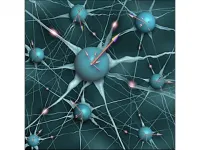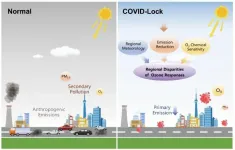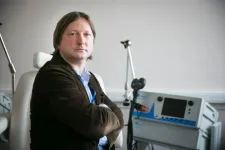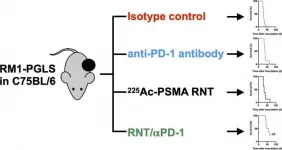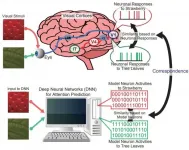(Press-News.org) Goal 7 of the Sustainable Development Goals (SDGs) aims to ensure access to affordable, reliable, sustainable and modern energy for all by 2030. Yet according to new research by Copenhagen Business School the poor planning and execution of decarbonisation strategies in emerging markets challenges the aims of Goal 7.
"In the effort to produce renewable energy and decarbonise their economies, emerging countries have neglected the effect on marginalised populations, which could ultimately prove unsustainable for all," says Assistant Professor Jacobo Ramirez from the Department of Management, Society and Communication at CBS.
The research, published in the Journal of International Business Policy, calls for policymakers and business to re-evaluate large-scale renewable energy investments in emerging markets to mitigate climate change and meet the SDGs.
Energy decarbonisation
Energy is a dominant contributor to climate change. According to the UN, it accounts for around 60% of global greenhouse gas emissions. Yet 770 million people still lack access to electricity, while a further 2.6 billion, mainly living in emerging markets, continue to rely on solid biomass such as firewood for fuel.
The study investigated the impact of wind investment on the lives of indigenous people from the Isthmus of Tehuantepec in Oaxaca, Southern Mexico. This region has some of the most powerful wind resources in the world, making it a hot spot for investment in wind energy.
But instead of bringing jobs, development and modern energy to the region, Mexico's current approach to energy decarbonisation has focused on large-scale investments that have benefitted multinational enterprises but left indigenous people behind. This has divided local communities and caused social conflict between opponents and supporters of wind energy.
While wind investments outwardly appear to be paving the way for a sustainable future, the research found that failings in Mexico - corruption, poor accountability, and limited access to information about energy and the environment - have led to public consultation processes that do not meet Mexican regulations or international conventions.
"Conflicts in the Isthmus could prevent decarbonisation, access to renewable energy, and democratic decision-making in the energy transition. To achieve Goal 7, we need to achieve governance in energy democracy in emerging economies like Mexico, with transparent decision-making processes that allow public participation in energy systems and investments," adds Ramirez.
Energy democracy
The study introduces a novel way of thinking about how governance can help - or hinder - the success of renewable energy ventures in emerging markets. To achieve governance in energy democracy, public policies should allow both collectives and individuals to challenge existing energy systems and shift resources towards new investment models, such as decentralised or community-owned renewable energy (CRE) systems. Indeed, CRE models are associated with increased local participation, acceptance, and benefit (both economically and environmentally) from renewable energy.
The research points to examples in countries like Denmark and the UK, where energy democracy has been implemented through decentralised CRE. "Decentralised CRE models ensure communities benefit from renewable energy, and empower them to control the energy system, from production to distribution. This can be encouraged by government, such as through regulation and financial incentives," adds Ramirez.
European models could be a source of inspiration for those investing in renewable energy in emerging economies to address poor governance and facilitate the transition to a decarbonised society. Nevertheless, this research highlights the need for strong institutions, as stated in Goal 16, for redesigning laws and conventions and engaging with marginalised communities.
"Indigenous people aspire to actively participate in renewable energy investments, beyond 'unfair' and 'unjust' public consultation processes. If other emerging markets do not learn from the mistakes made in Mexico, it may endanger the Sustainable Development Goals and undermine global efforts to mitigate climate change," concludes Ramirez.
INFORMATION:
An important class of challenging computational problems, with applications in graph theory, neural networks, artificial intelligence and error-correcting codes can be solved by multiplying light signals, according to researchers from the University of Cambridge and Skolkovo Institute of Science and Technology in Russia.
In a paper published in the journal Physical Review Letters, they propose a new type of computation that could revolutionise analogue computing by dramatically reducing the number of light signals needed while simplifying the search for the best mathematical solutions, allowing for ultra-fast optical computers.
Optical or ...
A way of using machine learning to more accurately identify patients with a mix of psychotic and depressive symptoms has been developed by researchers at the University of Birmingham.
Patients with depression or psychosis rarely experience symptoms of purely one or the other illness. Historically, this has meant that mental health clinicians give a diagnosis of a 'primary' illness, but with secondary symptoms. Making an accurate diagnosis is a big challenge for clinicians and diagnoses often do not accurately reflect the complexity of individual experience or indeed neurobiology.
Clinicians diagnosing psychosis, for example, would frequently regard depression as a secondary illness, with implications for treatment decisions which focus more on ...
The outbreak of COVID-19 raised a question about the relationship between anthropogenic emissions and air pollution, which has aroused heated discussion. Research on air-quality changes caused by the lockdowns in different areas shows similar substantial reductions in primary emissions. However, regional disparities exist in responses of secondary pollutants to emissions reduction, especially fine particulate matter and ozone (O3).
Professor Ding Aijun and his team from Nanjing University explored global air-quality changes during COVID-19 lockdowns and regional disparities in O3 responses to emission reductions. They integrated multiple observational datasets, including global air quality ...
In a new study published in Journal of Extracellular Vesicles, Chen-Yu Zhang's group and Antonio Vidal-Puig's group at University of Cambridge report that pancreatic β cells secrete miR-29 family members (miR-29a, miR-29b and miR-29c) in response to high levels of free fatty acids (FFAs). These β cell-derived miR-29s are delivered to the liver, promoting insulin resistance and enhancing hepatic glucose output.
Over 100 years after insulin was discovered, it was believed that pancreatic β cells only secreted a single hormone--insulin. Pancreatic β cell-derived insulin regulates glucose homeostasis by binding with the insulin receptors located in the liver, skeletal ...
The scientists of Tomsk Polytechnic University jointly with the colleagues from Keysight company have conducted an experiment with an electron beam at the TPU microtron to study a super-radiant regime that occurs when radiation is generated by a train of electron bunches. The research findings obtained by a high-precision measurement of a spectral line width proved that about 8,000 electron bunches in a super-radiant regime form monochromatic Cherenkov radiation. This experiment was conducted for the first time. The fundamental research findings are published in the Scientific Reports academic journal (IF: 4.120, Q1) and can be used for further research on the new sources of radiation in the terahertz range.
A super-radiant regime is a coherent ...
Scientists at HSE University have learned that disagreeing with the opinion of other people leaves a 'trace' in brain activity, which allows the brain to later adjust its opinion in favour of the majority-held point of view. The article was published in Scientific Reports.
We often change our beliefs under the influence of others. This social behavior is called conformity and explains varios components of our behaviour, from voting at elections to fashion trends among teenagers.
Brain research has recently well informed about short-term effects of social influence on decision making. If our choice coincides with the point of view of the people who are important to us, this decision is reinforced in ...
Reston, VA--A combination of radionuclide therapy and immunotherapy has proven successful in slowing the progression of prostate cancer and increasing survival time, according to new research published in the February issue of The Journal of Nuclear Medicine. The results of the murine study indicate that radionuclide therapy promotes prostate cancer immunogenicity, provoking a cellular response that makes the tumors more receptive to immunotherapy.
"Prostate cancer is generally viewed as an immunological cold cancer in which immunotherapies only have moderate success," said Katharina Lückerath, PhD, assistant professor of preclinical ...
Geoscientists have released a video that for the first time shows the uninterrupted movement of the Earth's tectonic plates over the past billion years.
The international effort provides a scientific framework for understanding planetary habitability and for finding critical metal resources needed for a low-carbon future.
It reveals a planet in constant movement as land masses move around the Earth's surface, for instance showing that Antarctica was once at the equator.
The video is based on new research published in the March 2021 edition of ...
This discovery was made possible by applying the research method for the comparison of the brain activity between monkeys and humans to artificial neural networks. This finding might be helpful not only to understand the cortical mechanism of attentional selection but also to develop artificial intelligence.
Deep neural networks (DNNs), which are used in the development of artificial intelligence, are mathematical models for obtaining appropriate mechanisms to solve specific problems from the training with a large-scale dataset. However, the detailed mechanisms underlying DNNs through ...
On Feb 5th, Seoul National University, College of Engineering (Dean Kookheon Char) announced that Professor Sang Woo Seo's research team (Dr. Jina Yang and Mr. Yong Hee Han (graduate student)) at School of Chemical and Biological Engineering has developed a synthetic protein quality control system to enhance full-length translation in bacteria. This technology is expected to increase the efficiency of the production of biopharmaceuticals, industrial enzymes, and bio-based chemicals.
Recombinant proteins are used in various industrial fields from protein drugs such as insulin to industrial proteins such as laundry detergents. Since proteins can perform their functions only with full-length and proper 3D structure, recombinant protein production ...
